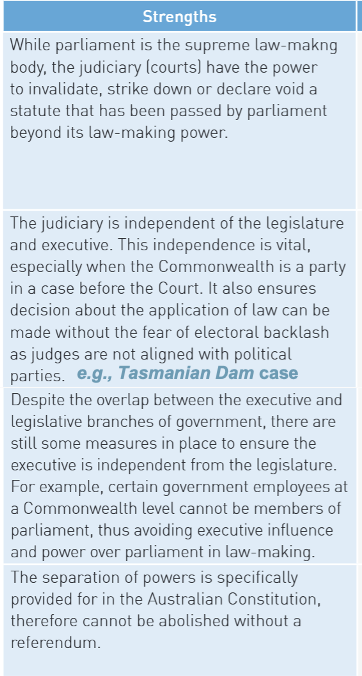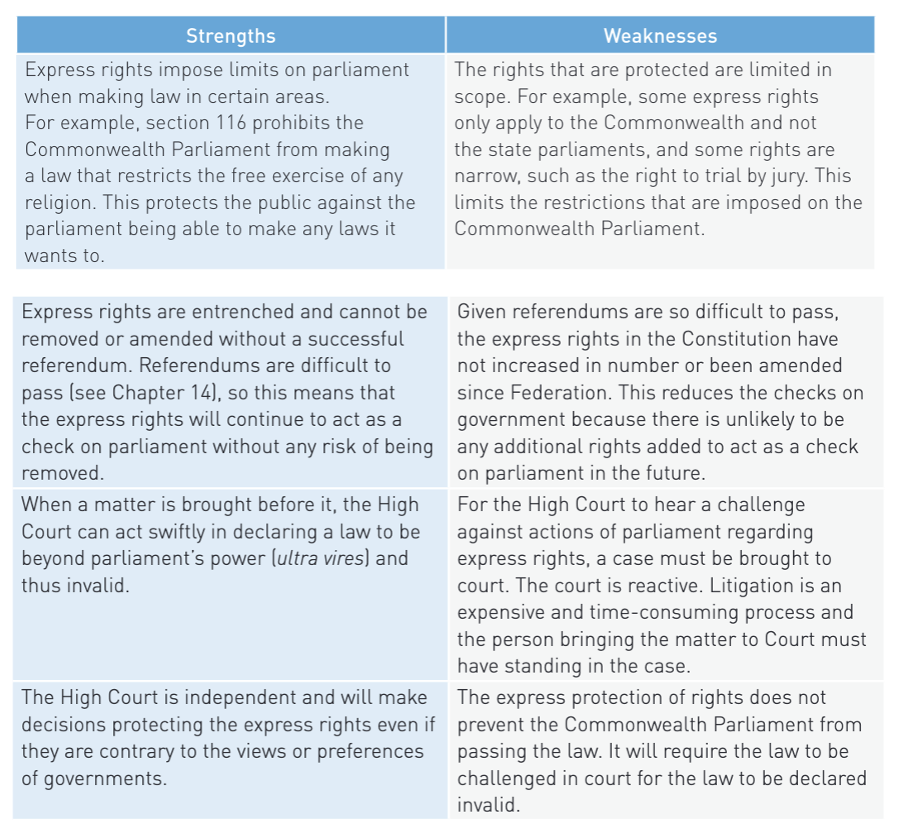How The Australian Constitution Acts as a Check on Parliament in Law-making: KK6
1/37
There's no tags or description
Looks like no tags are added yet.
Name | Mastery | Learn | Test | Matching | Spaced |
|---|
No study sessions yet.
38 Terms
what are ‘checks’ on parliament’s law-making
a ‘check’ on parliament is a process or structure designed to reduce the potential for abuse of power or corruption, such as parliament making laws that exceed its power
what are the checks?
the high court in protecting the system of representative government
the separation of powers
the express rights
1) representative government
the australian people vote in elections to chosen the politicians they want to make decisions and laws on their behalf
role of the high court
high court established under section 71 of Aus Constitution
section 76 gives the High Court the power to hear disputes arising under the Constitution or involving its interpretation
cannot change (remove/add) words of the constitution, but it can interpret the meaning
for example, the high court ruling on the meaning of the words ‘external affairs’ under s.51 (xxix): tas dam case
ultra vires
If the High Court finds that a parliament has made a law beyond its constitutional powers, this is called acting ultra vires (Latin for ‘beyond the powers’).
In such cases, the High Court can declare the law invalid and strike it down, meaning it has no legal effect.
s.109
superior courts (e.g., Federal Court) can also determine inconsistencies between state and Federal law, and deem the law inoperable to the extent of the inconsistency: McBain case
representative govt - constitution sections
Section 7 requires that senators must be “directly chosen by the people of the state”.
Section 24 requires members of the House of Representatives to be “directly chosen by the people of the Commonwealth”.
‘directly chosen by the people’
the high court has interpreted the meaning of ‘directly chosen by the people’ to show that a substantial majority of the population must vote in an election
this requirement is said to be a ‘constitutional bedrock’, which means it is a non-negotiable
how does the high court and representative government act as a check on the parliament in law-making?
parliament cannot legislate to remove elections - they are provided for in the constitution
the hc has interpreted the meaning of ‘directly chosen by the people’ to show that a substantial majority of the population must vote in elections
background of the roach case
In 2006, the Commonwealth Parliament passed legislation which banned all convicted and sentenced prisoners from voting in elections.
previous act in 2004 meant prisoners who were serving sentences longer than three years were banned from voting
Roach challenged the validity of the acts in the High Court
significance of the roach case
High Court held that the 2006 Act was inconsistent with the system of representative democracy established by the Constitution
infringed on section 7 & 24 which require parliament to be chosen directly by the people
commonwealth can only restrict the right to vote for a ‘substantial reason’ (committed treason, prisoners more than 3 yrs, unsound mind)
HC ruled that while the 2004 legislation was valid, it was unconstitutional for all sentenced prisoners to be denied the right to vote
protecting freedom of political communication - Australian Capital Television V Commonwealth case
the Australian Capital Television V Commonwealth case dealt with the commonwealth legislation that banned all political advertising on radio and television during election periods under the political broadcasts and political disclosures act 1991 (cth)
the high court held that the legalisation was invalid because it overrode an implied constitutional right - freedom of political communication
strengths of the high court in protecting the principle of rep government as a check on parliament in law-making
Judges are independent of the executive and the legislature, and decisions are based on appropriate legal principles rather than political pressure. The court seeks to uphold processes that promote representative government, even if they are contrary to the will of the parliament
The existence of the High Court allows individuals who have an interest in the case to bring the matter to court and have a law overturned. This reinforces that members of parliament are not above the law and the judges are able to overturn laws, such as those undermining the principle of rep gov
The judges are experienced in making decisions and have available to them a wide range of legal resources, ensuring that decisions are appropriate.
Both the High Court and the principle of representative government are contained in the Constitution and therefore can only be abolished if there is a successful referendum, therefore meaning that the Commonwealth can not remove them unilaterally
weaknesses of the high court in protecting the principle of rep government as a check on parliament in law-making
Judges can only rule on the facts of the case brought before them. They cannot create general principles of law outside the immediate case, which limits the Court's ability to protect the principle of representative government more broadly if the case does not address issues relating to that principle.
High Court judges cannot protect the principle of representative government unless a case is brought before them. Such cases are often complex and expensive for the ordinary person, and standing is required, therefore a law that does not uphold representative government may remain.
The decision of the High Court may depend on the composition of the Court. Some justices are more conservative in their approach to the Constitution and may be reluctant to adopt a liberal approach to interpreting the Constitution.
The interpretation of the scope of the principle, such as the ability of people to vote in elections, could be subject to further change if a future High Court interprets the Constitution differently.
2) separation of powers
a doctrine established by the Australian Constitution that ensures the three powers of our parliamentary system remain separate
ensures no one body has absolute power
executive power
the power to administer the laws and manage the business of government which is vested in the Governor-General as the King’s representative
section 61 states that the executive power is vested in the queen BUT in practise, this is carried out by the prime minister, senior ministers and govt departments
legislative power
the power to make laws, which resides with parliament
judicial power
the power given to courts and tribunals to enforce the law and settle disputes
section 71
overlap between legislative and executive arms
the legislative power and the executive power overlap
this means the power to administer the law and carry out the business of government (the executive power) is placed in the hands of the cabinet rather than the executive.
members of the executive (prime minister, ministers ect) sit in parliament (legislative)
the powers are also closely linked by the fact that laws passed by parliament must receive royal assent from the king’s representative to become law.
strengths of the overlap between the legislature and executive

weaknesses of the overlap between the executive and legislative
1. Reduced Independence and Separation
One of the main weaknesses is that the overlap weakens the doctrine of separation of powers.
Since members of the executive also sit in the legislature, it becomes difficult for Parliament to independently scrutinise the executive, especially if the government holds a majority in both houses.
This concentration of power can lead to a “rubber-stamp” Parliament, where legislation is passed with minimal debate or challenge.
2. Party Discipline Reduces Genuine Oversight
In Australia’s system, party discipline means MPs from the ruling party are expected to vote with the government, even if they disagree.
Backbenchers (non-minister MPs from the government party) rarely challenge the executive.
As a result, the executive isn’t truly being held accountable by Parliament, because everyone is following the party line.
This reduces the effectiveness of Parliament in checking executive actions, weakening its oversight function.
3. Executive Dominance over the Legislative Agenda
The executive controls the parliamentary timetable, which bills are introduced, and how much debate occurs.
This dominance allows the executive to prioritise its own interests and limit scrutiny of controversial legislation.
For example, bills may be rushed through the House of Representatives with limited time for MPs to review or propose amendments, undermining the deliberative role of Parliament.
the cabinet
the Cabinet consists of the prime minister and senior ministers in charge of a range of portfolios (or the premier and ministers at a state level), whose main role is to decide on general government policy.
Cabinet decide on what bills should be introduced to parliament.
importance of separating legislative and judicial
only a court or tribunal has the power to decide if the law has been contravened
role of the high court is to decide disputes on issues involving the constitution, however the courts can also make common law: NZYQ case
the courts are independent of political influence
this safeguards citizens against misuse of political power or corruption in the resolution of disputes.
ensures that the legislature is held accountable
how does the separation of powers act as a check on the parliament in law-making?
prevents the power to control the law being concentrated in one branch/arm/function
helps protect individual rights by providing checks and balances of the law-making of Commonwealth parliament
no one has ‘absolute power’
this limits the ability of a branch to abuse its power beyond what is granted under the Australian Constitution.
strengths of of the separation of powers

weaknesses of separation of powers
can only declare a law invalid if someone with standing brings the case before the court
the executive and legislative branch are not completely separate in the australian system - members of the executive also sit in parliament (reduces independence of branches and allows the executive to dominate parliament)
judges are appointed by the government - they may be able to influence decisions through their appointments (may choose judges that align with their ideological values)
only for commonwealth parliament
nzyq v minister for immigration case - facts
plaintiff (NZYQ) was a stateless refugee born in myanmar
in 2012 - arrived in Aus, was kept in immigration detention until 2014
in 2016 NZYQ pleaded guilty to a sexual offence against a child and was sentenced to 5 years imprisonment
upon release, NZYQ returned to immigration detention while the govt examined ways of sending him overseas
nzyq case findings/significance
High Court ruled that Australia's system of indefinite immigration detention was unlawful
held that relevant section of the Migration Act (1958) dealing with obligation to detain 'unlawful non-citizen' did not comply with constitution
High Court determined that if the purpose of detaining a non citizen is:
administrative - preparing non-citizen for deportation, or to get a visa = LAWFUL
punishment - indefinite detention, where realistic removal is not a prospect = UNLAWFUL as it breaches the separation of powers (unconstitutional) as only the courts have the power to detain someone for punishment
3) express rights
rights that are entrenched in the australian constitution, meaning that they can only be removed or changed by a referendum which was established by s.128
how do express rights operate as a check on parliament?
the parliament is restricted from making any law that breaches one of the express rights
any law that breaches these express rights will be declared invalid by the high court (provided that it is challenged by someone with standing)
five express rights in the aus consitution are:
the right to freedom of religion
the right to free interstate trade and commerce
the right to receive ‘just terms’ when property is acquired by the commonwealth
the right to trial by jury for indictable commonwealth offences
the right not to be discriminated against on the basis of the state where you reside
religion
Section 116 of the Australian Constitution states that the Commonwealth Parliament cannot make a law which:
establishes a state religion
imposes any religious observance
prohibits the free exercise of any religion - exception for national security or to ensure that people follow the laws of the country
requires a religious test as a requirement for holding any Commonwealth office.
Williams v Commonwealth (2012) facts
Williams challenged the Cth Govt’s power to fund a chaplaincy service running in a govt primary school
the Cth Govt entered into a funding agreement with Scripture Union Queensland to provide chaplaincy services
Williams argued the funding agreement was invalid because it was beyond the executive power of the Commonweahtlh (s61) and prohibited by s.116
the challenge relating to s116 was dismissed bc chaplains were not employees of the commonwealth
Williams v Commonwealth (2012) decision
HC found that s61 did not empower the Cth to enter into a funding agreement - as there was no act to give authority to the funding agreement, it was deemed invalid
then, parliament passed legislation to allow the chaplaincy program to be funded by Cth
HC found in favour of Williams, declaring that the agreement was invalid in relation to the school because they had no legislation to support this
trade
under section 92, interstate trade and commerce must be free
prevents parliament from treating interstate trade differently from trade within a state
provides freedom of movement between states, without burden or hinderance
can also refer to movement of people between states
acquisition of property on just terms
under s.51(xxxi) the commonwealth must provide just terms when acquiring property, that is the commonwealth must pay fair and reasonable compensation for property that is compulsorily acquired
commonwealth is only able to acquire property for a purpose or area for which it has the power to make laws; for example airports and national parks
jury trial
under section 80, there must be a jury trial for indictable commonwealth offences under the criminal law
only provides a limited right as:
most indictable offences are crimes under state law, and this section only applies to Commonwealth offences
the High Court has ruled that indictable means 'crimes tried on indictment’. Therefore, the operation of section 80 only extends to those most serious offences. The Commonwealth Parliament decides whether a crime is tried 'on indictment' or not.
Alqudsi v The Queen 2016
Alqudsi was charged under commonwealth law for terrorism-related charges
Alqudsi put forward a motion to be heard by a judge only
Alqudsi was unsuccessful as he was required by section 80 to be heard by a jury
discrimination on the basis of state residence
under section 117 it is unlawful for state and commonwealth governments to discriminate against someone on the basis of the state in which the person resides
strengths and weakness by which express rights act as a check on parliament in law-making
